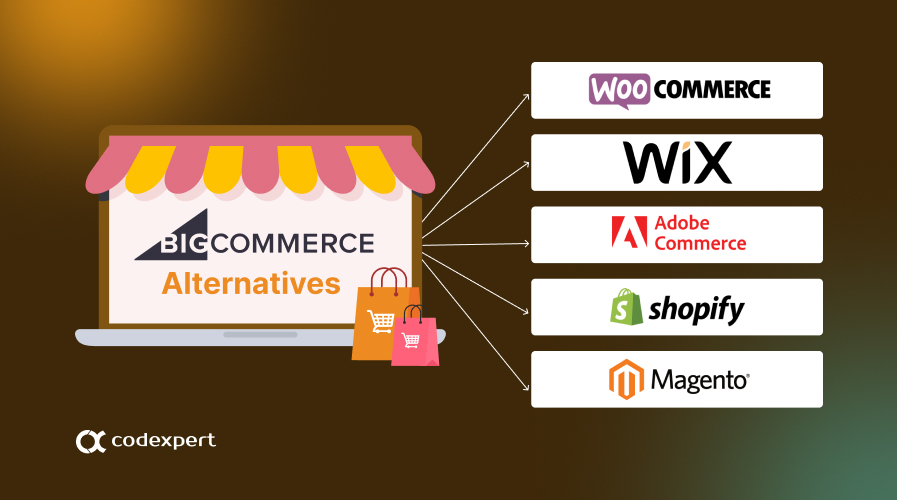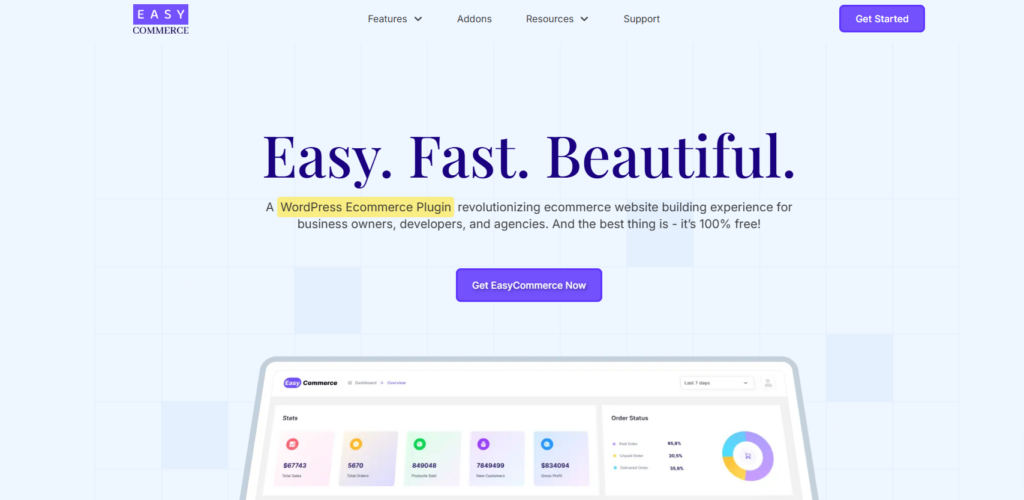8 Best BigCommerce Alternatives in 2025

BigCommerce may not be the most well-known CMS, but it has certainly secured a top position among the most popular platforms. However, it may not be equally useful or convenient for all businesses, as ecommerce is a dynamic field where factors constantly evolve and user demands vary significantly across different industries.
That’s why it’s wiser to keep one or two BigCommerce alternatives in hand in case you want a quick shift on short notice or looking for a better CMS platform other than BigCommerce. We have studied the big names in this arena and have carefully picked the top 7 for you.
Read on to explore the seven best BigCommerce alternatives in 2025.
4 Reasons You Should Look for BigCommerce Alternatives
Expensive Packages
BigCommerce charges extra for almost every feature. It has 250+ different category templates but as of now, only 12 can be used for free. For the paid templates, you have to pay a staggering amount of money ranging from $200-$300 on average.
Also, BigCommerce itself has separate pricing plans to activate i.e. $39 for Standard, $105 for Plus, and $399 for Pro, when billed monthly. Don’t forget about the custom Enterprise essentials which can cost between $1000 to $15000 based on your requirement and business size.
Overwhelming for Beginners
BigCommerce might come with a simple-looking interface, but entry-level users will face a hard time customizing and maintaining it. Also, there are always new out-of-the-box features added, which can make your customizing experience more complex.
To cope with this, users often have to go through steep learning curves including basic to medium-level coding which might not be favored by many.
Insufficient Payment Options
One major reason for searching for BigCommerce alternatives and perhaps a deal breaker would be its insufficient payment gateway offerings. It is advertised that BigCommerce has 65+ payment getaways including PayPal, Amazon Pay, etc. But still, it might not be enough when you are dealing with buyers from all around the globe.
The platform also charges additional transaction fees if you do not use their preferred providers. This can limit flexibility and increase costs for businesses that prefer other payment solutions.
Not Development Friendly
BigCommerce, while feature-rich, is often regarded as less development-friendly, particularly for those without a strong technical background. Customizing the platform to meet specific needs typically requires a solid understanding of HTML, CSS, and JavaScript.
Also, the development process can be further complicated by the lack of built-in support for staging environments. This absence of a dedicated staging area can create bottlenecks, as it forces developers to implement and test changes directly on the live site.
BigCommerce Comparison Overview
| Platform | Ease of Use | Customization Options | Features and Integrations | Scalability | Pricing | Support | SEO and Marketing Tools |
| EasyCommerce | Very user-friendly | Highly customizable | Integrates with various plugins | Highly scalable | Free; cost for plugins, hosting | 24/7 support; comprehensive docs; community support | Strong SEO capabilities(plugins) |
| WooCommerce | Moderate | Highly customizable | Integrates with numerous plugins | Scales with WP hosting | Free, costs for hosting, themes, plugins | Community support; paid hosting | Strong SEO capabilities(plugins) |
| Shopify | Beginner Friendly | Many third-party themes | Wide range of built-in features | Highly scalable; handles traffic spikes well | Tiered pricing | 24/7 support; comprehensive docs | Built-in SEO; apps for marketing |
| Squarespace | Very user-friendly | Primarily design-focused | Limited third-party apps | Best for small to mid-sized stores | Tiered pricing | 24/7 support; live chat | Basic SEO tools; limited marketing tools |
| PrestaShop | requires technical knowledge | Highly customizable via modules | Strong third-party module ecosystem | Scalable with right hosting | Free; cost for modules, hosting | Community support; paid support plans | Semi SEO; through modules |
| Joomla | Moderate to complex | Highly customizable via extensions | Wide range of extensions | Scales with hosting | Free; cost for hosting, extensions | Community- support; paid support options | Strong SEO; available |
| Adobe Commerce | Complex; developer friendly | Robust development environment | Extensive; built-in B2B, B2C features | Highly scalable; enterprise-level solution | High costs | 24/7 support for enterprise | SEO and marketing features built-in |
| Oracle Commerce | Highly complex | Customizable to specific business needs | Comprehensive feature sets | Highly scalable | High; suitable for large-scale businesses | Enterprise-level support | Advanced SEO and marketing tools |
8 Best BigCommerce Alternatives
1. EasyCommerce

EasyCommerce is a free and powerful ecommerce plugin designed for WordPress users who want to set up and manage an online store with ease. One of EasyCommerce’s biggest strengths is its API-first architecture, which makes it compatible with a huge library of WordPress themes, plugins, and third-party tools.
This unparalleled level of customization and flexibility lets you tailor any store’s design and functionality without limitations. Also, With a clean and intuitive dashboard, EasyCommerce provides real-time insights into sales, inventory, and customer data that makes store management smooth and efficient.
What We Liked
- EasyCommerce is optimized for speed which provides quick page load times that boosts user experience and reduces bounce rates.
- The built-in feature to automatically send cart reminders helps re-engage customers.
- With top-tier security measures in place, EasyCommerce ensures that your online store is protected against potential threats.
What We Didn’t Like
- While EasyCommerce supports integration with major payment gateways, the default options are limited.
Pricing
Free to download and use. But paid templates, themes, and features, are subject to payments.
2. WooCommerce
When it comes to making ecommerce websites, the name ‘WooCommerce’ slips into our minds instantly. And it’s no wonder over 6 million websites are built using WooCommerce.
This WordPress derivative stands out as the leading BigCommerce replacement any day, due to its combined feature arrangements, ease of use, affordability, and the massive number of users.
WooCommerce started operation in the early 2010s as an ecommerce website builder plugin. Since then it has created an ecosystem of its own with thousands of templates, add-ons, and plugins developed especially for WooCommerce use only.
What We Liked
- WooCommerce is truly a place for medium to big ecommerce entrepreneurs.
- This platform offers completely free online business-building solutions.
- Users with prior WordPress experience will find WooCommerce quite relatable.
- A huge user community to help you sort any WooCommerce-related issues.
What We Didn’t Like
- Won’t integrate with business websites that are built using something other than WordPress.
Pricing
Free to download and start using. However, paid templates, themes, and features, are subject to payments.
3. Shopify
Shopify is a dominant candidate in the race to replace BigCommerce. It is a leading ecommerce platform that caters to the user with not just designing but also managing their online stores, tracking orders, easy payment solutions, etc. Merchants all around the globe use this platform to build their virtual stores and reach millions of consumers in the blink of an eye.
Shopify serves over 2.2 million active users and powers businesses with a combined value exceeding $400 billion globally. Its success is driven by its user-friendly interface, scalability to support businesses of all sizes, and a comprehensive suite of inventory and sales management features. These strengths have made Shopify a go-to platform for ecommerce success.
What We Liked
- Shopify comes with an extended amount of customization possibilities with its extensive app ecosystem.
- 24/7 live customer support starts with the Basic package which is very crucial when you’re starting from the ground base.
- User-friendly interface ensures a smooth navigation journey both for the users and their audiences.
- Highly modernized checkout pages to increase the possibility of converting a potential buyer to an actual one.
What We Didn’t Like
- Shopify requires a monthly/yearly subscription fee which can become a headache for entry-level users with small budgets.
Pricing
A 3-day trial period is adjoined by a $1 payment for the first month. The basic plan starts from $19/month when billed annually. Add theme, and template costs if you have chosen a paid one.
4. Squarespace
Squarespace is an all-rounding website-building platform for creating astounding websites. Unlike BigCommerce, Squarespace offers a far and wide variety of options to create websites that meet versatile needs.
Another good reason for you to choose Squarespace is that it comes with a hosting plan which makes things more convenient and secure for the users.
When it comes to customization capability, Squarespace shines bright among the industry leaders. From turning basic dimensions, and changing font colors to injecting custom codes, Squarespace offers it all. Don’t forget about the immense amount of third-party integration you are getting alongside.
What We Liked
- Its template and theme repository consist of varying types and genres including ecommerce.
- Point of Sales (POS) functionality lets you sell your products physically while processing the payments using your online store.
- Suitable for small to medium-sized enterprises that are looking at continuous business expansion soon.
What We Didn’t Like
- Limited customizability if you don’t know about coding much as well as the pricing seems to be high compared to the feature variations.
Pricing
Premium Subscription comes with a 14-day initial free trial period. There are four plans available: Personal ($16/month), Business($23/month), Commerce Basic ($28/month), and Commerce Advanced ($52/month) when billed annually.
5. PrestaShop
PrestaShop is a freemium, open-source ecommerce website builder. Initially developed as a school project in 2005, this PHP-based CMS workframe quickly grew as one of the leading website-building platforms.
PrestaShop has a dedicated add-on store called PrestaShop Addons which complements merchants’ desire to integrate various features into their online store swiftly.
Following strategic partnerships with platforms like Meta, Google, and TikTok, managing payments, ad campaigns, and budgeting has become significantly easier for PrestaShop marketers and merchants. Despite a recent decline in user numbers, PrestaShop remains a strong contender as an alternative to BigCommerce due to its certain advantages.
What We Liked
- A database of skilled PrestaShop add-on developers is listed on the PrestaShop website if you’re looking for one.
- It has a default stats tool called PrestaShop Metrics, which is similar to the Google Search Console in nature and is very reliable.
- In-house store audits provided by PrestaShop are very helpful in discovering which improvements can be made and achieving a better overall conversion rate.
What We Didn’t Like
- It requires decent PHP programming language knowledge to customize the features yourself.
Pricing
Free to install and use. Requires additional payments if you choose to use paid themes, or add-ons.
6. Joomla
It would be a crime if we didn’t include the name Joomla in our BigCommerce alternative list. This award-winning CMS platform is among the earliest and has gained constant popularity over the years.
With almost 2 million active users today, Joomla holds over 6% of the CMS market worldwide. A dependable code base followed by highly demanding features are some of the reasons for its popularity and longevity.
Joomla’s core features include essential add-ons like multilingual support (70+ languages), 8,000+ unique extensions, and powerful cache management to speed up the ecommerce websites; making it a standout choice for BigCommerce replacement.
What We Liked
- Flexible customization opportunities have inspired the developers to create newer and more advanced feature add-ons.
- From installing for the first time to adjusting basic parameters, plenty of resources to guide you while using Joomla.
- A rich volume of templates, themes, and addons to design various website types including ecommerce ones.
What We Didn’t Like
- Templates developed for one version of Joomla aren’t compatible with other versions, creating a migration restriction in between.
Pricing
Free to install using the default template. Paid templates and themes are accessible on JoomShaper, Themeforest, etc., and are subject to additional payments.
7. Adobe Commerce
Adobe Commerce started its journey as Magento before it was acquired by Adobe Inc. in 2018. This CMS platform fulfills the missing void of a highly advanced range of existing innovations within the Adobe Experience Cloud umbrella. It is a flexible and scalable platform and has revolutionized the overall B2B and B2C user interaction among users and sellers for some time.
Its implementation of AI has addressed users’ struggle to extract reliable insights about their business while helping them plan strategies accordingly. Special care was given to enhance mobile responsiveness, as the majority of the visitors are from smaller screened devices.
What We Liked
- Seamlessly integrate with the world’s largest online marketplace Amazon using APIs which increases the chance of getting noticed by millions.
- An exceptionally developed inventory and order management system ensures reduced effort for merchants and seamless store operations.
- A long queue of payment solutions becomes crucial as the user would love to have convenient payment options after purchasing.
What We Didn’t Like
- Adobe Commerce is somewhat complex to set up and maintain and the initial pricing is quite high compared to others.
Pricing
Pricing for the premium subscription varies from user to user depending on their requirement and the number of features being used. You can find more information about the quotation process here.
8. Oracle Commerce
If you’re aiming to scale your ecommerce business, Oracle Commerce is an ideal choice. This enterprise-level, integrated ecommerce solution is designed for large businesses that require more than just a website.
Oracle Commerce offers a seamless, synchronized platform that includes powerful customer relationship management (CRM), enterprise resource planning (ERP), and marketing automation tools, which makes it a comprehensive solution.
Oracle offers a comprehensive package that handles everything from website setup to servers and physical infrastructure. While highly reliable, the cost can be prohibitive for small and medium businesses.
What We Liked
- Integrated usability remains the primary reason for choosing Oracle Business over BigCommerce.
- Oracle Commerce Cloud is a highly scalable platform because you can extend it as far stretched as you want, in parallel to your business growth.
- 24/7 support is crucial to avoid disruptions in business operations due to unexpected issues.
What We Didn’t Like
- Not recommended for small businesses, as their operation isn’t as widespread.
- This platform is becoming obsolete, as newer and more advanced yet cost-efficient solutions have emerged.
Pricing
Starting from $2000 but varies depending on users’ requirements.
Wrapping Up
Every CMS platform has its own strengths and weaknesses, and BigCommerce is no exception. While it’s a popular choice, it’s not always the perfect fit for every situation. In this blog, we’ve explored several alternatives to BigCommerce, highlighting their individual pros and cons.
Ultimately, the best platform for you will depend on your unique needs, and we hope this guide helps you make an informed decision. Trust your instincts, and choose the option that aligns best with your goals!
Frequently Asked Questions (FAQs)
Why not use BigCommerce?
BigCommerce is a great CMS platform but it comes with limitations such as restricted annual sales limit, customization requiring decent coding proficiency, not being developer friendly, etc., and many more.
Which is better BigCommerce or WooCommerce?
Both platforms have their upsides and downsides. Our favorite one is WooCommerce; it is open-source, easy to use, and resembles WordPress CMS.
It is also affordable, requires less maintenance, and can be managed by users having lower technical knowledge.
Which ecommerce platform is best for small businesses?
Small businesses don’t require advanced features and broad arrangements to run their online stores. So, it is better to go for ecommerce-oriented paid themes from WordPress. For more detailed features, you can add the WooCommerce plugin with it.
Subscribe to Our Newsletter
Get the latest WordPress tutorials, trends, and resources right in your inbox. No Spamming, Unsubscribe Anytime.

Thank you for subscribing to our newsletter!
Table of Content
- 4 Reasons You Should Look for BigCommerce Alternatives
- Expensive Packages
- Overwhelming for Beginners
- Insufficient Payment Options
- Not Development Friendly
- BigCommerce Comparison Overview
- 8 Best BigCommerce Alternatives
- 1. EasyCommerce
- What We Didn’t Like
- Pricing
- 2. WooCommerce
- 3. Shopify
- 4. Squarespace
- 5. PrestaShop
- 6. Joomla
- 7. Adobe Commerce
- Wrapping Up
- Frequently Asked Questions (FAQs)
- Why not use BigCommerce?
- Which is better BigCommerce or WooCommerce?
- Which ecommerce platform is best for small businesses?











